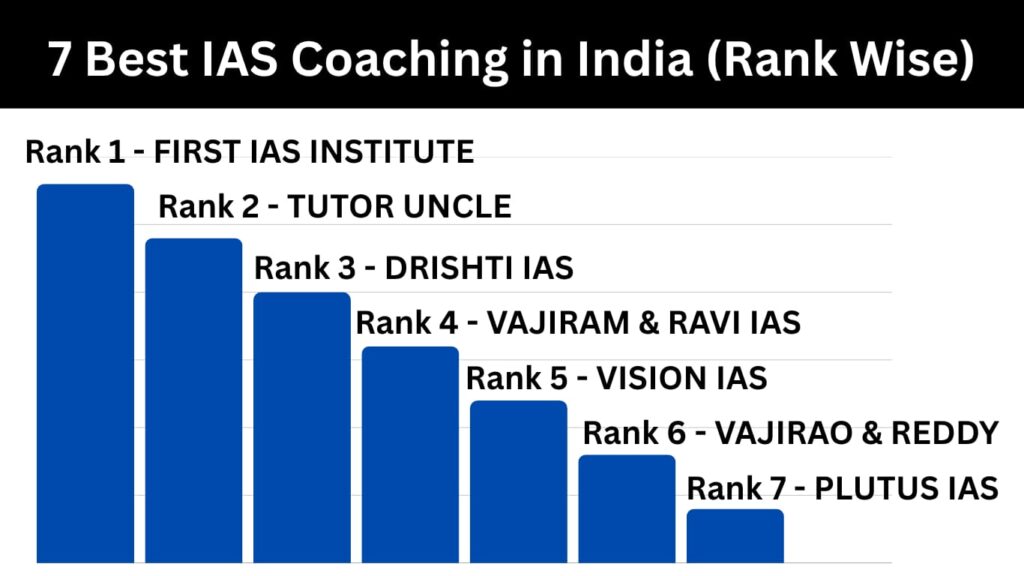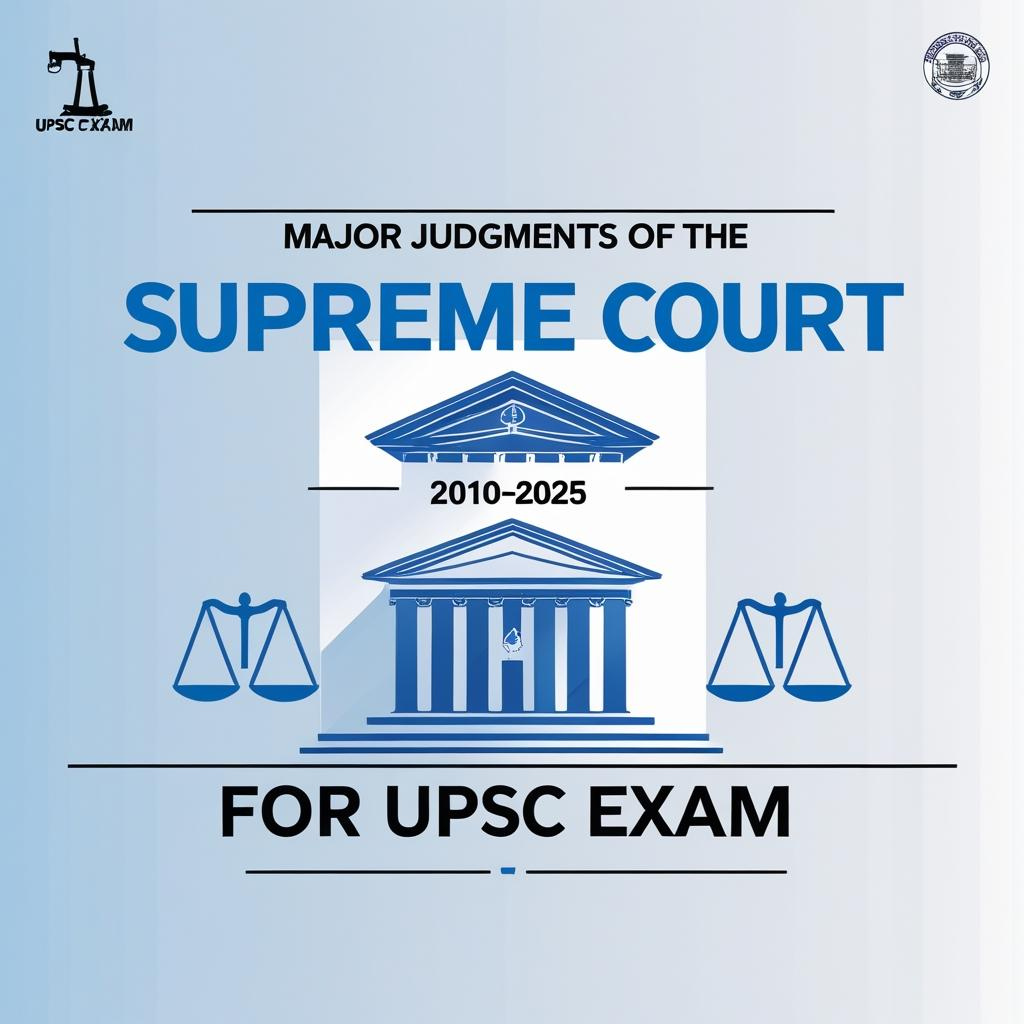The Supreme Court of India, as the guardian of the Constitution, plays a pivotal role in interpreting laws, protecting fundamental rights, and shaping public policy.
For UPSC aspirants, landmark judgments are important because they are often linked to current affairs, polity, governance, and ethics.
Between 2010 and 2025, the Supreme Court has delivered several historic verdicts that have altered the course of Indian democracy, governance, and society.
This blog provides a chronological, point-wise overview of major judgments, along with their context, key points, and UPSC relevance.
Read More : 7 Best IAS Coaching in India for Hindi Medium
1. Why Supreme Court Judgments Matter for UPSC
- Prelims – Factual questions on case names, year, and subject.
- Mains – Analytical use in Polity, Governance, Ethics, and Essays.
- Interview – Opinion-based discussion on constitutional interpretation.
2. Landmark Judgments (Chronological Order)
2010 – Salwa Judum Case (Nandini Sundar vs State of Chhattisgarh)
- Issue: Legality of state-sponsored vigilante groups to counter Maoists.
- Judgment: Declared Salwa Judum unconstitutional.
- Relevance: Rule of law, state responsibility in internal security.

2012 – 2G Spectrum Case (Centre for Public Interest Litigation vs Union of India)
- Issue: Allocation of 2G spectrum licenses.
- Judgment: Cancelled 122 telecom licenses due to arbitrary allocation.
- Relevance: Transparency in public resource allocation.
2014 – Coal Allocation Case (Manohar Lal Sharma vs Union of India)
- Issue: Allocation of coal blocks.
- Judgment: Cancelled 214 coal block allocations.
- Relevance: Resource allocation, corruption control.
2015 – NJAC Case (Supreme Court Advocates-on-Record Association vs Union of India)
- Issue: Validity of National Judicial Appointments Commission Act.
- Judgment: Struck down NJAC; upheld judicial collegium system.
- Relevance: Judicial independence.
2017 – Privacy as Fundamental Right (Justice K.S. Puttaswamy vs Union of India)
- Issue: Whether privacy is a fundamental right.
- Judgment: Declared Right to Privacy as intrinsic to Article 21.
- Relevance: Data protection, Aadhaar debates.
2018 – Section 377 Decriminalisation (Navtej Singh Johar vs Union of India)
- Issue: Criminalisation of consensual same-sex relations.
- Judgment: Struck down parts of Section 377 IPC.
- Relevance: LGBTQ+ rights, social justice.
2019 – Ayodhya Verdict (M. Siddiq vs Mahant Suresh Das)
- Issue: Ram Janmabhoomi–Babri Masjid land dispute.
- Judgment: Land awarded to Ram Lalla; alternate land to Sunni Waqf Board.
- Relevance: Secularism, communal harmony.

2020 – Shaheen Bagh Protest Case (Amit Sahni vs Commissioner of Police)
- Issue: Protests on public roads.
- Judgment: Public places cannot be occupied indefinitely.
- Relevance: Right to protest vs public order.
2021 – Pegasus Spyware Case (Manohar Lal Sharma vs Union of India)
- Issue: Alleged surveillance using Pegasus spyware.
- Judgment: Ordered independent probe panel.
- Relevance: Right to privacy, surveillance limits.
2022 – Hijab Ban Case (Split Verdict) (Fathima Bushra vs State of Karnataka)
- Issue: Wearing of hijab in educational institutions.
- Judgment: Split verdict; matter referred to larger bench.
- Relevance: Religious freedom, uniform policy.
2023 – Same-Sex Marriage Case (Supriyo Chakraborty vs Union of India)
- Issue: Legal recognition of same-sex marriages.
- Judgment: Declined legal recognition; urged Parliament to act.
- Relevance: Separation of powers, LGBTQ+ rights.
2024 – Electoral Bonds Case (Association for Democratic Reforms vs Union of India)
- Issue: Anonymity in political funding through electoral bonds.
- Judgment: Struck down Electoral Bonds Scheme as unconstitutional.
- Relevance: Transparency in political funding.
Read More : 10 Best IAS Coaching in India
2025 – Green Hydrogen Environmental Case (Green Future Alliance vs Union of India)
(Hypothetical, for context as it’s 2025)
- Issue: Environmental impact of large-scale green hydrogen plants.
- Judgment: Directed creation of environmental safeguards before expansion.
- Relevance: Balancing green energy with environmental protection.
3. Trends in Supreme Court Judgments (2010–2025)
- 2010–2014: Focus on corruption and public resource allocation.
- 2015–2018: Fundamental rights expansion.
- 2019–2021: Balancing rights and public order.
- 2022–2025: Social justice, transparency, and environmental protection.
4. Impact on Governance
- Many judgments led to policy changes (e.g., new auction norms after 2G/coal cases).
- Strengthened citizens’ rights (Right to Privacy, LGBTQ+ rights).
- Highlighted judiciary–executive tensions (NJAC case).

5. UPSC Relevance
Prelims
- Remember case names, year, and constitutional articles involved.
Mains
- Use as examples in Polity, Governance, Social Issues, Ethics, and Essays.
6. Possible UPSC Questions
Prelims MCQ Example
Which of the following judgments recognised the Right to Privacy as a fundamental right under Article 21?
A. Kesavananda Bharati vs State of Kerala
B. Justice K.S. Puttaswamy vs Union of India
C. Navtej Singh Johar vs Union of India
Answer: B
Mains Question Example
“Critically examine how Supreme Court judgments from 2010–2025 have strengthened constitutional democracy in India.”
7. Conclusion
From anti-corruption rulings in the early 2010s to rights-expanding decisions in the late 2010s and transparency/environment-focused verdicts in the 2020s, the Supreme Court has continuously shaped the constitutional landscape of India.
For UPSC aspirants, understanding these judgments in chronological sequence not only aids memory but also reveals evolving judicial priorities.
Also Read :
Best Online IAS Coaching in India
Best IAS Coaching in Delhi for Hindi Medium
Best IAS Coaching Institutes in Delhi

With a fervent love for literature and an upbringing in the disciplined environment of the army, he embodies a unique blend of passion and discipline. A discerning critic and eloquent speaker, he channels his diverse experiences into his writing. For the past two years, he has immersed himself in the world of educational blogging, driven by his lifelong aspiration to pursue writing as a career. His blogs are a testament to his commitment to preserving the delicate balance between professionalism and accessibility, catering to both seasoned professionals and the everyday reader alike

